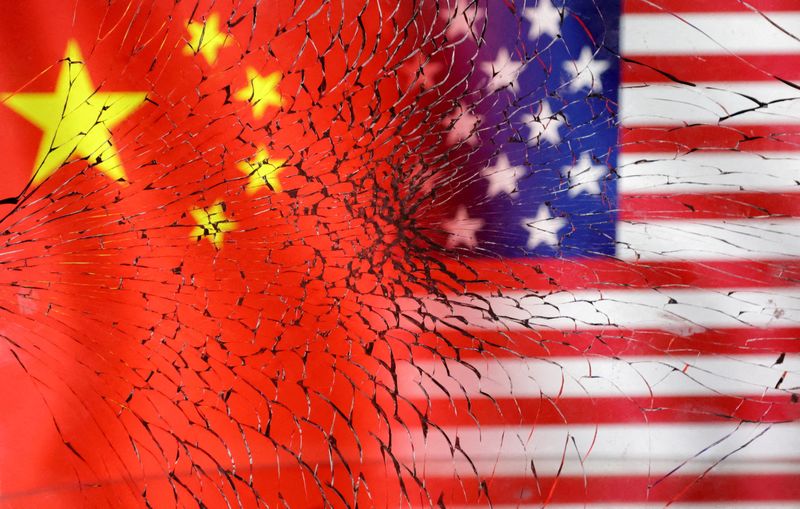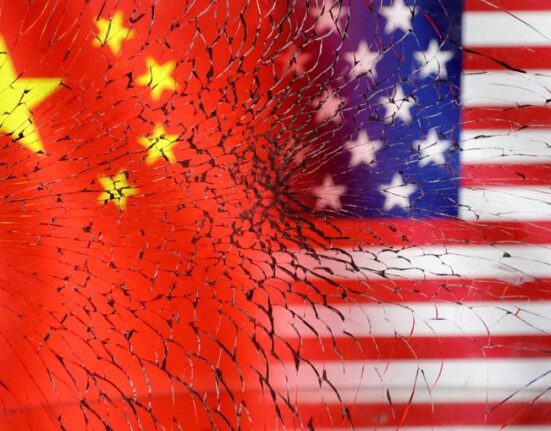By Alexandra Alper, Michael Martina, Jeffrey Dastin and Karen Freifeld
(Reuters) -The Trump administration is considering a plan to curb a dizzying array of software-powered exports to China, from laptops to jet engines, to retaliate against Beijing’s latest round of rare earth export restrictions, according to a U.S. official and three people briefed by U.S. authorities.
While the plan is not the only option on the table, it would make good on President Donald Trump’s threat earlier this month to bar “critical software” exports to China by restricting global shipments of items that contain U.S. software or were produced using U.S. software.
On October 10, Trump said in a social media post that he would impose additional tariffs of 100% on China’s U.S.-bound shipments, along with new export controls on “any and all critical software” by November 1 without further details.
To be sure, the measure, details of which are being reported for the first time, may not move forward, the sources said.
But the fact that such controls are being considered shows the Trump administration is weighing a dramatic escalation of its showdown with China, even as some within the U.S. government favor a gentler approach, according to two of the sources.
“Clearly the U.S. is looking for points of leverage and we are really good at software, so it’s not so surprising that this administration has considered it,” said Emily Kilcrease, a former trade official now at the Center for a New American Security.
However, it would be extraordinarily difficult to implement and there would be blowback for U.S. industry, she said. “You would hope they are only putting threats on the table that they would carry out and stick with.”
U.S. stock indexes briefly extended losses on the news, with the S&P 500 down 0.8% and the Nasdaq 1.3% lower before paring their losses.
The White House declined to comment. The Commerce Department, which oversees export controls, did not respond to requests for comment.
A spokesperson for the Chinese embassy did not comment on the specific U.S. measures under consideration but said China opposed the U.S. “imposing unilateral long-arm jurisdiction measures” and vowed to “take resolute measures to protect its legitimate rights and interests” if the U.S. proceeds down what it views as a wrong path.
MEASURE COULD BE USED TO PRESSURE CHINA
Administration officials could announce the measure to put pressure on China but stop short of implementing it, one of the sources said. Narrower policy proposals are also being discussed, two of the people said.
By Alexandra Alper, Michael Martina, Jeffrey Dastin and Karen Freifeld
(Reuters) -The Trump administration is considering a plan to curb a dizzying array of software-powered exports to China, from laptops to jet engines, to retaliate against Beijing’s latest round of rare earth export restrictions, according to a U.S. official and three people briefed by U.S. authorities.
While the plan is not the only option on the table, it would make good on President Donald Trump’s threat earlier this month to bar “critical software” exports to China by restricting global shipments of items that contain U.S. software or were produced using U.S. software.
On October 10, Trump said in a social media post that he would impose additional tariffs of 100% on China’s U.S.-bound shipments, along with new export controls on “any and all critical software” by November 1 without further details.
To be sure, the measure, details of which are being reported for the first time, may not move forward, the sources said.
But the fact that such controls are being considered shows the Trump administration is weighing a dramatic escalation of its showdown with China, even as some within the U.S. government favor a gentler approach, according to two of the sources.
“Clearly the U.S. is looking for points of leverage and we are really good at software, so it’s not so surprising that this administration has considered it,” said Emily Kilcrease, a former trade official now at the Center for a New American Security.
However, it would be extraordinarily difficult to implement and there would be blowback for U.S. industry, she said. “You would hope they are only putting threats on the table that they would carry out and stick with.”
U.S. stock indexes briefly extended losses on the news, with the S&P 500 down 0.8% and the Nasdaq 1.3% lower before paring their losses.
The White House declined to comment. The Commerce Department, which oversees export controls, did not respond to requests for comment.
A spokesperson for the Chinese embassy did not comment on the specific U.S. measures under consideration but said China opposed the U.S. “imposing unilateral long-arm jurisdiction measures” and vowed to “take resolute measures to protect its legitimate rights and interests” if the U.S. proceeds down what it views as a wrong path.
MEASURE COULD BE USED TO PRESSURE CHINA
Administration officials could announce the measure to put pressure on China but stop short of implementing it, one of the sources said. Narrower policy proposals are also being discussed, two of the people said.












Leave feedback about this